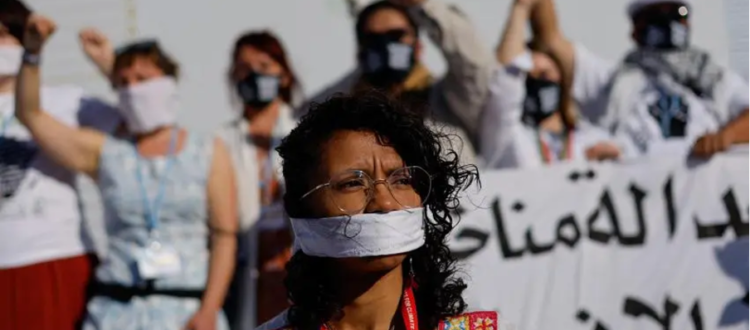BEYOND THE GATES OF CLIMATE NEGOTIATIONS: CIVIL SOCIETY CLAIMS ITS RIGHTS
Anyone who is involved in the climate change debate or reads our articles will certainly have recognised the enormous emphasis placed on mainstreaming human rights in these discussions. The role of civil society emerges as crucial, being the most reliable driving force in pushing institutions to respond to the demands for change expressed by the scientific community. The wide range of civil society and indigenous peoples’ actors operate in a civic space where they are free to exercise their fundamental rights of expression, association, and assembly, unhindered by the government.
But what happens when civic space is restricted or even removed?
At a meeting organised by Climate Action Network (CAN), Amnesty International and 350.org in Bonn, the big elephant in the room was discussed.
The COP27 in Egypt, a country whose serious human rights violations and limited civic space are unfortunately also known to Italy, provoked strong criticism. Access and active participation of civil society groups from all over the world were repeatedly hampered, with significant consequences on negotiations. Fear and concern about mistreatment, violence, and intimidation both inside and outside the venue have undermined the essential contribution of civil society.
Now, the fear is that participants at the next COP28, to be held in the United Arab Emirates, may face even stricter restrictions. Since 2011, local civil society has been progressively isolated, with the introduction of laws that punish with imprisonment any form of dissent, even peaceful dissent, that is expressed through personal expression, association or assembly. In addition, Emirates records significant violations of the right to privacy, workers’ rights, women’s rights and sexual rights.
Therefore, in preparation for the upcoming COP28, civil society has submitted a number of proposals to protect civic space and ensure public participation in the UNFCCC process.
The first proposal is to declare during these interim sessions in Bonn that public participation and civic space be respected without discrimination or interference during all stages of the negotiation processes. The current and future Presidencies, together with the UNFCCC Secretariat, are therefore urged to create a safe and conducive environment for human rights defenders, environmental defenders, women, indigenous peoples and civil society organisations.
Egypt, which currently holds the COP27 chairmanship, is urged to fulfil its international human rights commitments by releasing those who have been arbitrarily detained, particularly those who participated in peaceful protests during the negotiations.
The UAE is, on the other hand, encouraged to work towards significant progress on human rights before COP28. This includes the release of activists detained without just cause and the abolition of oppressive laws that restrict civil and political rights and discriminate against women, queer people and marginalised groups.
Finally, the UNFCCC secretariat is urged to take proactive measures to ensure the security of all participants in the negotiations. This includes the development of well-defined human rights norms and principles, which must be included in agreements with host countries in a public and transparent manner. Although the issue of civic space has emerged more emphatically in recent years, especially during negotiations held in non-democratic countries, it is crucial to remember that UN policies against all kinds of harassment and discrimination during COPs are still very weak. For this reason, we call for the establishment of a focal point for reporting violence and retaliation and for closer cooperation with other UN agencies to facilitate possible reparations.
To address the root causes of global crises, including the climate crisis, it is imperative to establish democratic, representative and participatory multilateral institutions. It is futile and deeply hypocritical to discuss the inclusion of human rights in negotiations if, once outside the negotiating door, these rights are ignored. When, on a theoretical level, the importance of the voice of the people is claimed, it is then crucial to ensure that this voice is actually expressed and heard.
Article by Camilla Pollera, ICN Volunteer

